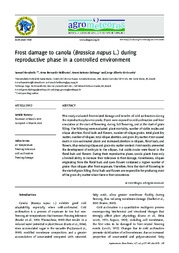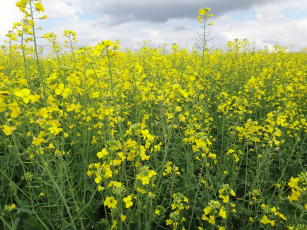Frost damage to canola (Brassica napus L.) during reproductive phase in a controlled environment.
Frost damage to canola (Brassica napus L.) during reproductive phase in a controlled environment.
Author(s): KOVALESKI, S.; DALMAGO, G. A.; GOUVEA, J. A. de
Summary: This study evaluated frost-related damage and benefits of cold acclimation during the reproductive phase in canola. Plants were exposed to cold acclimation and frost simulation at the start of flowering, during full flowering, and at the start of grain filling. The following were evaluated: plant mortality, number of viable ovules and silique abortion, floral buds and flowers, number of silique grains, total plant dry matter, number of siliques, total silique abortion, and grain dry matter. Frost caused death in non-acclimated plants and increased abortion in siliques, floral buds, and flowers, thus reducing silique and grain dry matter content. Frost mostly prevented the development of embryos in the siliques, but viable ovules were found in the floral buds and flowers. During their reproductive phase, canola plants have only a limited ability to increase their tolerance to frost damage. Nonetheless, siliques originating from the floral buds and open flowers contained a higher number of grains than siliques after frost exposure. Therefore, from the start of flowering to the start of grain filling, floral buds and flowers are responsible for producing most of the grain dry matter when there is frost occurrence.
Publication year: 2019
Types of publication: Journal article
Unit: Embrapa Wheat
Keywords: Air temperature, Cold acclimation, Freezing damage, Freezing tolerance
Related content
Observation
Some of Embrapa's publications are published as ePub files. To read them, use or download one of the following free software options to your computer or mobile device. Android: Google Play Books; IOS: iBooks; Windows and Linux: Calibre.
Access other publications
Access the Agricultural Research Database (BDPA) to consult Embrapa's full library collection and records.
Visit Embrapa Bookstore to purchase books and other publications sold by Embrapa.


